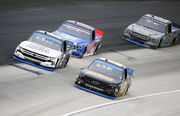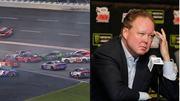
via Getty
WINSTON SALEM, NORTH CAROLINA – OCTOBER 26: Dale Earnhardt Jr. drives the NASCAR Next Gen car around the track at Bowman Gray Stadium during a testing session on October 26, 2021 in Winston Salem, North Carolina. (Photo by Grant Halverson/Getty Images)

via Getty
WINSTON SALEM, NORTH CAROLINA – OCTOBER 26: Dale Earnhardt Jr. drives the NASCAR Next Gen car around the track at Bowman Gray Stadium during a testing session on October 26, 2021 in Winston Salem, North Carolina. (Photo by Grant Halverson/Getty Images)
Over the past decade or so, all-electric motorsport has been on the rise. Previously, the general populace would have scoffed at such a notion, but since then, there have been several all-electric series. This includes Formula E, MotoE, eTouring Car, Extreme E, Electric GT, Jaguar I-Pace eTrophy, and many more. Interestingly, there are two significant absences from this list, namely IndyCar and NASCAR.
According to the latest rumors, NASCAR could be the next to jump onto the electric car bandwagon. Last year, the stock car series had just introduced the Next Gen car, and it is currently in its second season. However, with the way that technology is constantly progressing, do they really want to be left out? As a result of all this, the rumor mill believes that NASCAR may explore that rabbit hole in the future.
ADVERTISEMENT
Article continues below this ad
When did the idea of an all-electric NASCAR series begin?
Sometime in 2022, there were talks of a demonstration race at the LA Coliseum in 2023. However, that has pretty much not come to pass, considering that we are in 2023, and there was no sight of a demonstration race. This hypothetical race would have consisted of 900-volt batteries and 1,000 horsepower all-wheel drive cars, all thanks to three electric motors. Another feature of these cars would be regenerative braking, which helps in efficiency. This would be especially useful on tracks that involve heavy braking, like the road courses. According to reports, the regenerative system is said to generate as much as 200 kilowatts.

via Getty
DAYTONA BEACH, FLORIDA – JANUARY 12: A NASCAR Next Gen model sits on display in the garage during the NASCAR Next Gen Test at Daytona International Speedway on January 12, 2022 in Daytona Beach, Florida. (Photo by James Gilbert/Getty Images)
According to reports, there were supposed to be a grand total of six races, aligned to the Cup Series. Each race was supposed to have two legs and each would have been half an hour long. As for the grid, it would have featured 12 vehicles running on a full battery until the end without charging or swapping batteries. With the 1000 horsepower, there was hope to mimic the speed of the regular NASCAR cars. Sadly, all these grandiose plans are now a pipe dream or are delayed indefinitely.
Would an all-electric series actually work in theory?
Some pundits believe that this could potentially attract new fans and even new manufacturers. The latter is because it would help the automobile companies progress into the future. However, there is a concern about long-time fans who may not be as receptive to the move as they are more traditional. Another point in hosting an electric series is that it could be cost-effective and energy-efficient. However, they would have to sacrifice elements like the raw sound of the roaring engine.
Few also observed that this would help NASCAR in the long run. This is because the state of California aims to sell zero-emission electric vehicles by 2035. If the stock car series can contribute to that with this initiative, it would go a long way toward securing its future. At the end of the day, since the world is beginning to adopt the use of Electric Vehicles (EVs), it makes sense for NASCAR as well. After all, they also need to evolve with the times or risk ending up obsolete.
READ MORE: NASCAR’s 2024 Money Game: Opening the Jaw-Dropping Million Dollar Curtain
Trending
Total electrification is still a long way away for NASCAR
According to Toyota Racing Development president David Wilson, “Obviously social and market forces are driving all of us as car manufacturers to be respectful and to be sensitive to put carbon reduction at the front of our business. When you take it to the race track, I think every motorsport globally is faced with the same pressures, including NASCAR. The question is how and when and what. What I’ll say is all of us sitting up here have been working very closely with NASCAR on new technologies, on a focus towards reduction of carbon, but it continues to be a work in progress.”
It is worth mentioning that Chief Operating Officer Steve O’Donnell said that NASCAR is targeting 2024. He dreams of an age where fans can watch any form of motorsport and any type of power, electric, or hydrogen. In addition to that, fans can also see cars with loud engines, which embody NASCAR. However, despite the 2024 target, there is no timetable for any engine changes to the current spec.

via Getty
WINSTON SALEM, NORTH CAROLINA – OCTOBER 26: Dale Earnhardt Jr. drives the NASCAR Next Gen car around the track at Bowman Gray Stadium during a testing session on October 26, 2021 in Winston Salem, North Carolina. (Photo by Grant Halverson/Getty Images)
Aside from all the big teams, even the OEMs are working towards hybridization. This work isn’t just limited to NASCAR though. It also extends to other racing series, like IMSA. Even IndyCar has plans to introduce hybrid engines by 2024, so they won’t fall behind in the technology race. One thing is for sure, all motorsport series are keeping an eye on developing technologies and trying to incorporate them into their machines.
ADVERTISEMENT
Article continues below this ad
The transition to electric power units will not be immediate
According to Ford Performance Motorsports global director Mark Rushbrook, one aim could be to bring a “low carbon fuel” or “a responsible fuel”. In essence, the teams will still use combustion engines, but will eventually transition to electric power units. He observed that such a system is prevalent in other racing series, and NASCAR could do it as well. With this, the stock car racing series can lower its carbon footprint.
As long as the manufacturers can work alongside OEMs, things will run smoothly. Eventually, NASCAR will embrace the notion of electrification, when the time and technology are right. With the Cup, Xfinity and Truck series, and other national series, there is a chance to introduce new technology. Of course, another big concern comes from the drivers themselves. Would they be receptive to the electric revolution?
ADVERTISEMENT
Article continues below this ad
Already the steps have been taken because the Next Gen car was built with an electric future in mind. NASCAR insists that in theory, the all-electric cars would be just as fast as their internal combustion engine counterparts. However, the downside is that the cars would not last as long. Like with Formula E cars, the focus will most likely be on conserving energy and trying to make the cars last as long as possible. Of course, this is all in theory because the electric plans are not concrete just yet.
WATCH THIS STORY: From Chase Elliott To Kurt Busch: 5 Times The Next-Gen Cup Series Car Proved How Unsafe It Is
ADVERTISEMENT
ADVERTISEMENT
ADVERTISEMENT
ADVERTISEMENT






